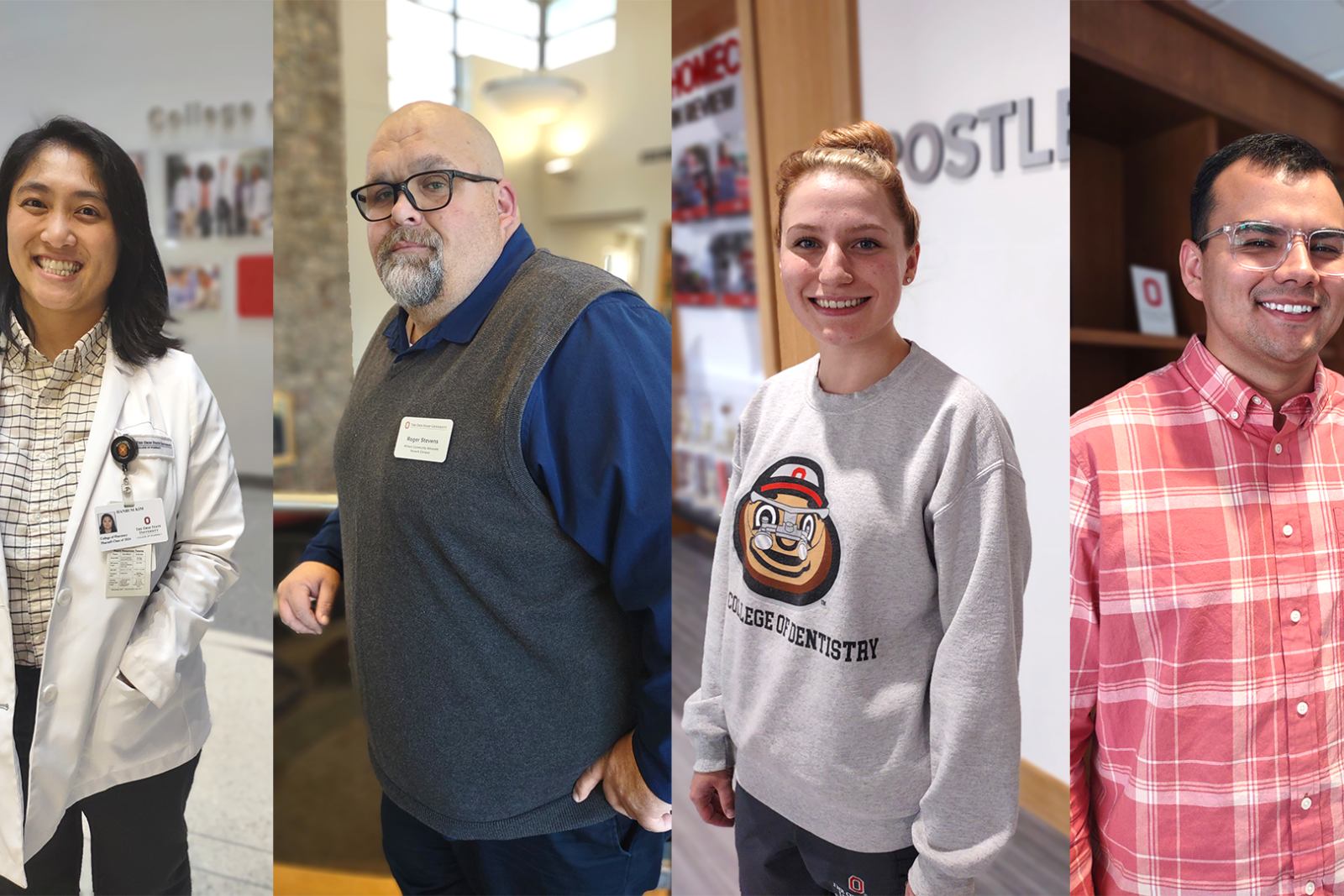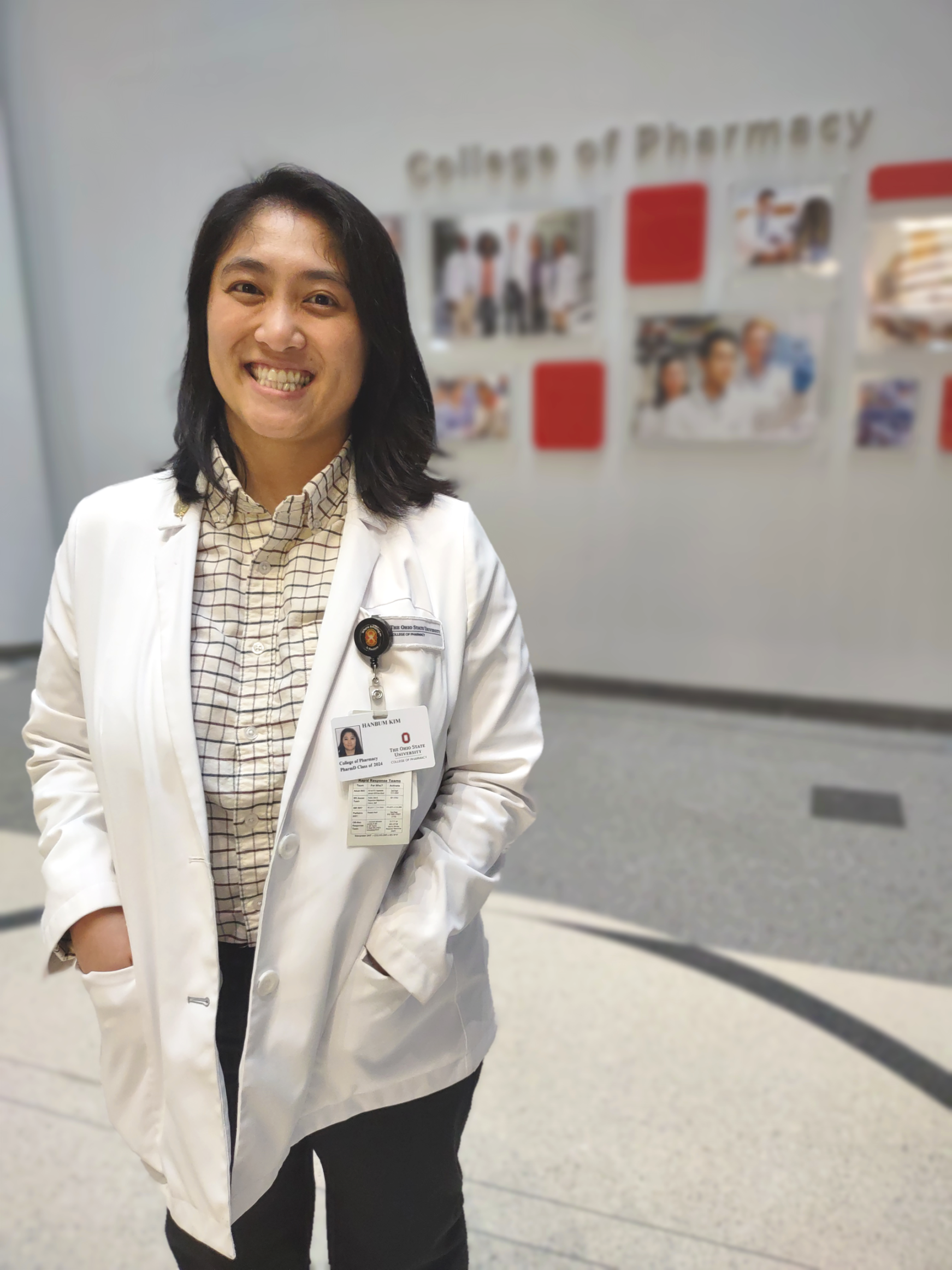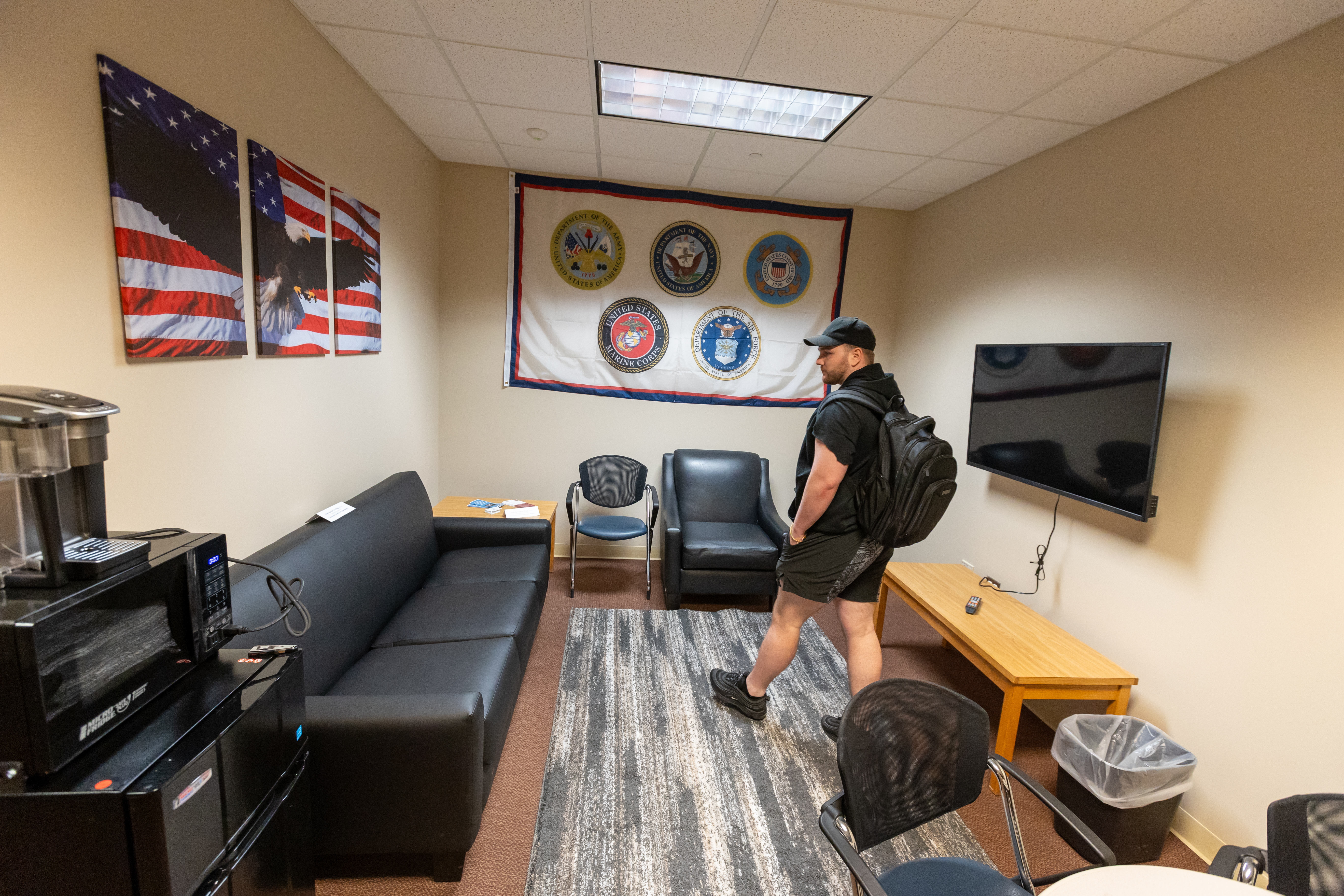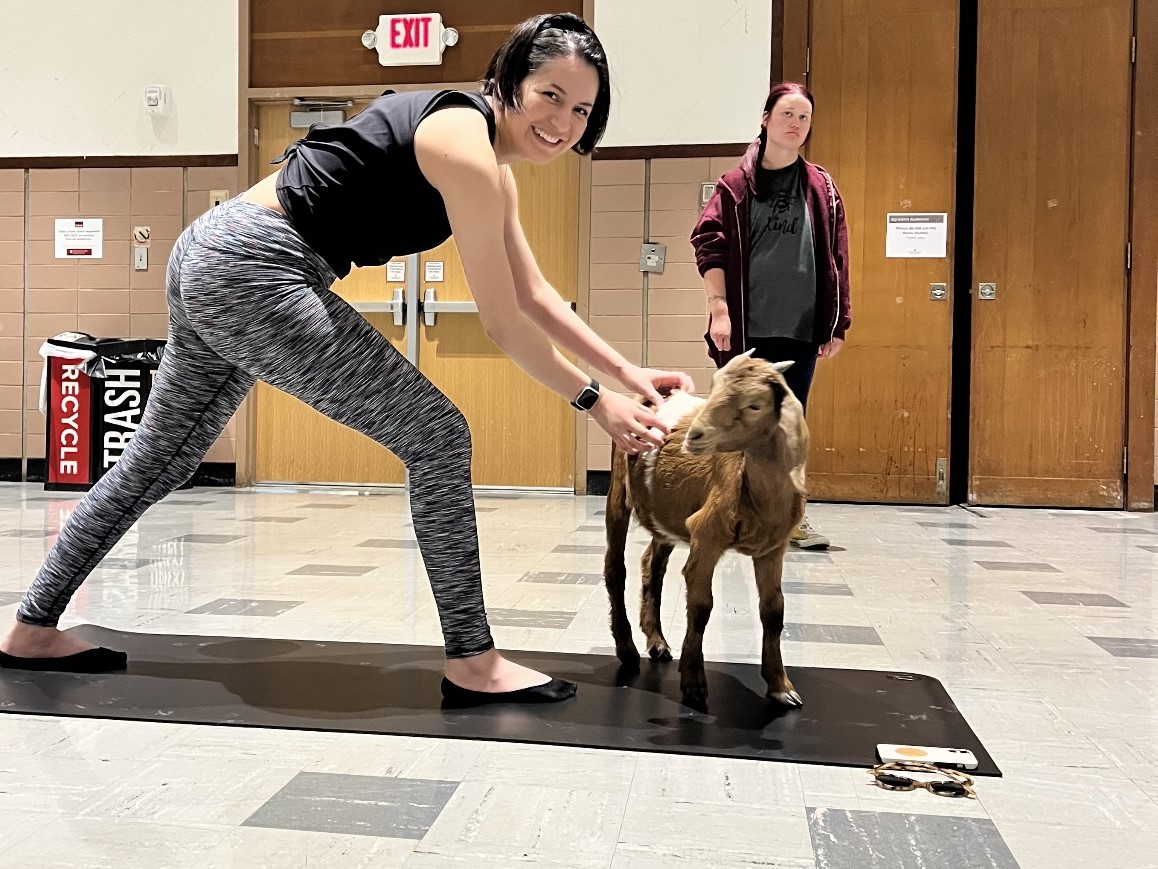Military Community Advocates connect students and build community

This story was originally published by The Ohio State University Office of Academic Affairs.

After serving three years as an Army medic, Hanbum Kim arrived at The Ohio State University in 2019 eager to fulfill her dream of becoming a pharmacist — nine years after initially enrolling as a Buckeye.
After taking time off to work following her sophomore year and then enlisting, her transition back to Ohio State began seamlessly. But when a bad leg break requiring the insertion of titanium plates and screws was followed by illness and disruption during the COVID-19 pandemic, Kim began to feel isolated.
“When my cast came off, I was self-conscious because I had an awkward gait,” said Kim. “Later, I was at home in Centerville, Ohio, nursing my dad, who had contracted COVID, and then was down for about a month with COVID myself. It was a really hard time physically and mentally, and I started to wonder if there was a place for me here.”
An announcement recruiting military-connected and veteran students for the Major Lawrence Miller Military Community Advocate (MCA) Program was the lifeline Kim needed. And by helping other military-connected students find community and support, she gained a community herself.
As one of 32 MCAs at Ohio State, Kim's role is twofold. MCAs help their designated academic unit, campus or engagement area understand the unique challenges facing student veterans at Ohio State and develop specific plans to improve interaction between the two. They also establish outreach programs for fellow veteran students, the campus population and the surrounding community.
“This program is very personal for me,” added Kim, who was candid about being a lesbian during her MCA interview. The Doctor of Pharmacy student is now in her fourth year as the LGBTQ+ Initiatives MCA, a position Military and Veterans Services created with her in mind.
“To advocate for student veterans who are part of the LGBTQ+ community and educate those who support them is a special honor for which I am very grateful.”
Resources to help all feel welcome and supported
Roger Stevens, a second-year MCA at Ohio State Newark, held a good-paying job as a cable installer for 20 years after leaving the Navy, but saw veterans suffering in the community.
“You see homeless veterans, veterans with substance abuse problems, and I told my wife, ‘I want to help,’” said the Heath, Ohio, native.
Stevens, who will complete his Master of Social Work in May, also understands the challenges many older veterans face when returning to the classroom. After years or decades away from formal learning, some need help with study skills or technology assistance. Others, like Stevens, arrive with little knowledge of veterans’ benefits or the broad range of financial, academic and support services available to Ohio State student veterans.
And many keenly feel differences between themselves and traditional-age students, but long for a sense of connection and belonging.
Stevens’ goal is to help every veteran find the assistance they need, whatever that might be. And to connect veterans so they can lean on each other as they once did in the service.

In September, Ohio State Newark opened a Veterans Lounge, providing a dedicated study and gathering space for this population. Stevens immediately began a monthly outreach program featuring community advocates and access to veterans’ services. His November program included a representative from Jobs and Family Services who assists local employers with hiring veterans, resume assistance and alleviating other barriers veterans seeking employment may experience. A planned future speaker, a veteran from Heartland Bank, will share information about loans through the Department of Veterans Affairs. Stevens’ monthly email offers Newark campus veterans resource and program information.
But mostly, Stevens wants fellow military-connected students to know that he and others at Ohio State are there to help. He encourages veterans to drop by the lounge.
“Of all the groups I've ever worked with, the people I served with in the veteran community are the closest of any group I've ever been with. If you are a veteran coming to Ohio State, reach out and become part of this community. There are people who can help with every area you need help with.”
Breaking down barriers
MCA Jena Hickman, a 2022 Ohio State Army ROTC graduate, is in the Army Reserve. The Tiffin, Ohio, native will complete the Doctor of Dental Surgery (DDS) program in the College of Dentistry in 2027. MCA Will Lopez, active-duty Navy, is currently assigned to Ohio State’s Naval ROTC and will complete his bachelor’s degree in political science in 2025. Both will continue their military careers after degree completion.
And both reaffirm the sentiment expressed by Kim and Stevens — community, connection and support are the foundation for the military-connected community at Ohio State.
“Being surrounded by people from all different military branches and walks of life just helps give you a sense of community and belonging, which is what I was looking for when I first got here," said Hickman. "That's a big selling point for the MCA program for me and a lot of others; I knew I had found my people.”
Hickman, who served as the Suicide Prevention MCA last year, noted that some associate the military with a disposition to always tough it out through any situation. After speaking at a suicide awareness gathering on campus, she was approached by the father of a veteran who had committed suicide. “He said, ‘Thank you. Thank you for bringing this up because it's just not talked about enough because it's uncomfortable.’”
That moment, said Hickman, will stay with her forever.
“It's so important to connect with veterans who may feel lost or are just trying to find their way.”
Creating Positive Impact
Part of the MCA program's important work is breaking down barriers and helping start conversations about the struggles anyone can experience. MCAs also work to alleviate stress and build community through social gatherings. Throughout the year, dozens of events such Clippers games, curling lessons and paint and pizza nights, movies, bowling and family rock climbing, and even goat yoga offer activities for all members of the military-connected community.
Lopez, from Louisville, Kentucky, started as the Parent and Family Relations MCA this semester. Married with two young children, he understands the importance of offering family-oriented activities, so his first event was a weekend trip to Lynd Fruit Farm in Pataskala.
“While I'm here at school, I'm studying all the time,” said Lopez. “I'm on a strict timetable to complete my degree. This program has been an incredible opportunity for me to reach out and get other people involved and immerse myself in the university community while spending more time with my family.”

And while the fruit farm trip attracted a group of around 30, Lopez noted that unless military-connected students are using military benefits or self-identify, Military and Veterans Services has no way of knowing who they are.
“I talk to people at crosswalks, go to the veterans lounge, figure out who the vets are in my classes and where vets on campus hang out,” noted Lopez.
New military-connected students are assigned a peer sponsor who contacts them weekly, offering tips, tricks and check-ins. Lopez admits though, that like many students, initially he wasn’t reading the information being shared.
His advice to anyone in the military-connected community?
Reach out and respond.
“My first semester, I was struggling — from figuring out how to navigate CarmenCanvas to finding out why my laptop wasn't working — everything just seemed a lot to deal with,” said Lopez.
But when he finally connected with Military and Veterans Services for help, their response was immediate — from helping Lopez get a loaner laptop through the Student Technology Loan Program to understanding his academic plan.
“That first semester set the tone for me,” said Lopez. “I learned that there are people here to help me. That spoke volumes about how helpful the community is here at Ohio State, which is a big deal for me. I know I'm not here alone.”
Learn more about Ohio State’s military-connected community
A decade ago, longtime former Ohio State staff member Jim Miller had the vision to honor his father’s military service, and through the university’s Military and Veterans Services, established the Major Lawrence Miller Military Community Advocate (MCA) program. From its humble beginnings with a single veteran student advocate, the goals were simple:
- Create a network among military students across the university.
- Help faculty and staff better understand the needs of military students.
- Build a military service community through programs, events, service projects and professional development.
Today, Ohio State boasts more than 30 scholarship MCAs across the university’s six campuses. Each MCA enhances inclusive excellence and adds tremendous value to the academic experience, both inside the classroom and beyond in local communities. Ohio State’s MCA program is nationally recognized and has served as a model to establish advocate programs at 15 other colleges and universities nationwide.
Through the generous help of donors, not only do military community advocates graduate with less student loan debt, but they also continue meaningful service within their communities.
Ohio State currently serves more than 2,180 military-connected students and broader Buckeye military family members. Learn more about Ohio State's military-connected services at the Military and Veterans Services website.